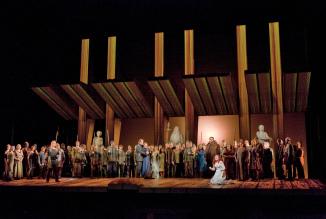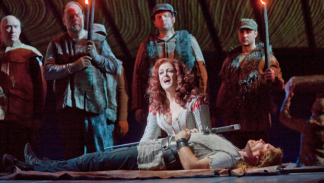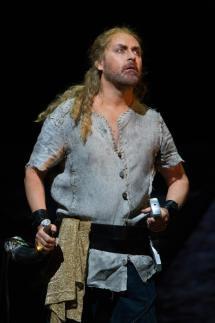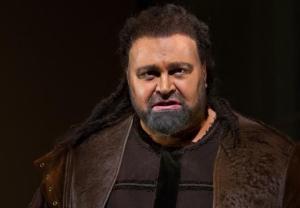
Goetterdaemmerung – Act II (Ken Howard / Met Opera)
Conventionally Speaking…
Overlapping duets, an estimable ensemble display, that spine-tingling vengeance trio that closes Act II, rousing male choruses, a drinking song, melodious solo narratives… Heck, what was Wagner thinking when he penned his penultimate, large-scale stage work, Götterdämmerung? Everything he ever railed against in his musical life – uniformity, conformity, operatic tradition, and operatic conventions – are here in huge dollops.
Despite the sheer size of the piece (the Prologue and Act I alone last all of two hours!), and the fact that it was the be-all and end-all of that monumental music project known as the Ring of the Nibelung, it’s incredible how many quiet moments there are – more “soft spots” and moving passages than even I can remember. And despite all the disclaimers it is, indeed, Wagner’s most “operatic” work that comprises the mighty Ring cycle at the Metropolitan Opera House, the last broadcast of the 2012-2013 radio season, given on May 11, 2013.
Now that I’ve gotten my own disclaimer out of the way, here are a few words about the production overall. The Ring project was directed by French-Canadian Robert Lepage (The Damnation of Faust), with set designs by Carl Fillion, lighting and video imaging by Etienne Boucher and Boris Firquet, respectively, and costume designs by François St.-Aubain. As most wags will tell you, it’s more “popularly” known as “The Machine,” which makes reference to its 45-ton weight of 24 movable and interconnected planks that move and turn and twist and fold into various configurations, onto which video images, colors, shapes and patterns of all kinds are projected.
When this ignoble contraption worked, it worked remarkably well. But when it failed, it failed royally, delaying and/or hindering matters to no end. If all these planks did was to tell Wagner’s story, then so be it. But a Ring cycle without a concept, or even an artistic purpose or overarching theme, is no Ring cycle at all. I happen to agree with music critic Alex Ross in that this was the most ill-conceived and hare-brained Ring production I’ve ever been privy to, worse even than La Fura dels Baus’ acrobatic Ring in Valencia, Spain. At least that production had movement and space to spare, whereas the Met Opera’s version was claustrophobically confined to those noisy planks.
The above opinion is partially comprised of the singing. So let me get this off my chest while it’s still fresh in my mind: I was most disappointed in, of all people, Bryn Terfel’s Wotan/Wanderer in the first cycle from last year. As noted in my Die Walküre review (http://josmarlopes.wordpress.com/2013/05/18/die-walkure-at-the-met-a-funny-thing-happened-on-the-way-to-the-opera/), Terfel’s sound is much too bright for the part. The voice is certainly large enough and he had no trouble with breath control or diction or high notes. Where he failed, in my view, was in the role’s darkest confines: he was simply incapable of conveying the character’s inner turmoil by either stage comportment or vocal means.
In Mozart or Strauss, and in lighter Verdi or Wagner fare, Terfel is the undisputed grandmaster, but as the head god he lacked gravitas for some reason. His counterpart, Mark Delavan, is more of a natural fit, the core of the voice easily encompassing most of the part’s requirements. Don’t get me wrong. Terfel is an excellent singer and a fiercely dedicated, serious artist to boot, especially in such parts as Scarpia in Puccini’s Tosca, or as Verdi’s Falstaff, Sondheim’s Sweeney Todd, or Strauss’ Jokanaan in Salome. But Wotan is not yet within his grasp.

Deborah Voigt as Brunnhilde (minnesotapublic radio.org)
Valkyrie Ends Her Ride
As for Deborah Voigt’s Brünnhilde, I’ve already discussed my preference for her in the French repertoire (see my review of Berlioz’s Les Troyens – http://josmarlopes.wordpress.com/2013/01/06/opera-review-berlioz-les-troyens-a-wooden-horse-of-a-different-color/). In Strauss, she is most impressive, but I’m afraid at this stage in her career Wagner’s Valkyrie is just not the role for her. I felt this at the beginning of the cycle and I feel it now. Squally high notes, pitch shy vocalism, barely skirting the limits of her vocal range, and less than perfect German. Argh!!! I wasn’t troubled by all that as much as I was by her screechy tone. Voigt always seemed to be overpowered by the many A’s, B’s, and C’s this role demands. All in all, she did not sound comfortable in the radio broadcast, despite the hearty ovation she earned for her efforts.
Welsh soprano Gwyneth Jones, who had some of the squalliest high-notes this side of Cardiff, had no difficulty in cutting through Wagner’s orchestrations. Jones also brought an unmatched emotional intensity, vocal vibrancy, womanly allure and exceptional acting ability to the part. In that respect, Deborah was woefully inadequate, although she was more at home with the role’s dramatic aspects, particularly in the forcefully enacted second act.
On the other hand, Voigt’s Immolation Scene was well handled if not altogether vocally resplendent. The quieter portions were more tolerable, shall we say; but the more energetic sections were painful to listen to. I urge Voigt to reconsider taking this role on in the future. Perhaps my impression would be altered inside the theater, but on radio it’s exactly as I’ve described it. None of her high B’s was pleasant or easily produced. And a Brünnhilde without those has strictly limited stage mileage. Still, Voigt gets high marks for merely attempting the part, but I was sure glad when the ordeal was over – and that’s not a good thing.

Lars Cleveman as Siegfried (Marty Sohl / Associated Press)
Swedish tenor Lars Cleveman was a light-voiced Siegfried, boasting fine delivery and excellent enunciation, mixed with a slightly nasally texture. He sounded sufficiently like Jay Hunter Morris (who sang the first round of Siegfrieds) to fit into the general scheme. Cleveman showed stamina and strength in his Act II oath, as well as wonderfully clarion tone in his emotionally satisfying Act III narrative. The voice stayed fresh and true throughout, which is a marvel in this day and age. We’ve been blessed with a bevy of fine heldentenors lately, which is a most welcome trend I have to say.
Lars Cleveman reminds me of a young Set Svanholm, a bit short on top, a little dry in his upper reaches, but more than acceptable in the long run. He made no attempt at all at the demanding high C (“Hoiho, hoihe!”) in Act III. Then again, those who have attempted it in the past lived to regret their decision. I suppose that skipping the high note was the best course of action, at least on live radio. I have heard worse, however. Cleveman’s death scene was gently and poignantly delivered, a real coup for him.
Bass Hans-Peter König as Hagen is a giant of a man, with a voice to match. He has all the requisites to become an outstanding Nibelung’s son. High notes, low notes, nothing daunted this German singer. My only complaint – well, whine, if you prefer – was his inability to give the words their proper weight and meaning. Other less vocally endowed artists – I’m thinking of Josef Greindl or Fritz Hübner here, even the forgotten Bengt Rundgren – were able to express all the menace and vileness this fiendish creation calls for through purely verbal means. And Rundgren had a steelier voice at that, if my recollection serves me.

Hans-Peter Konig as Hagen
König’s already superbly-endowed vocal element only adds to his stage arsenal. He has ample time to develop this aspect of his characterization, which I do hope to takes to heart. Finnish bass Matti Salminen, in the Met’s previous cycle and in the Valencia Ring, is the perfect embodiment of Hagen, both vocally and histrionically. König can eventually top him, but he still has a ways to go. His massive Act II call to the Vassals was more effortful this time around than I recalled from last season, but otherwise one felt that König was in control of his vocal resources, which he husbanded throughout this long afternoon. A wise decision, I’d say!
Baritone Iain Patterson’s Gunther captured his character’s weakness and self-satisfied opinion of himself, sometimes to the singer’s detriment. The vocal performance was a shade off his previous high standard (he was Gunther in last year’s complete cycle as well). Patterson came into his own in Act II, as most Gunthers do, with a thrillingly sung trio. His sister Gutrune, voiced by soprano Wendy Bryn Harmer, mixed amorous thoughts of possessing Siegfried with expert vocalism, within the confines of her two-dimensional part. Opportunities to shine were strictly limited, however.
Karen Cargill was a moving Waltraute, Brünnhilde’s Valkyrie sister, without effacing memories of Waltraud Meier in the role. Richard Paul Fink previously sang the part of Alberich in the old Otto Schenck production. Here, he provided a nice contrast to Eric Owens, who sang Alberich throughout the first two cycles. Fink’s more nasal delivery and vocal quality fit the repulsive nature of his character, but I missed Owen’s acting skills here. Although it’s a brief assignment, Alberich’s lone appearance sets the stage for the great Act II confrontation between the major characters.
The Met’s principal conductor Fabio Luisi took the podium again. He kept everything in balance, his movement of the orchestra was fluid and lean, and this was, as noted before, a more lyrically inclined, less bombastic approach to Götterdämmerung than either a James Levine or a Lorin Maazel would lead. Still, I can’t help wishing that Riccardo Muti or Valery Gergiev, or even Daniel Barenboim, would be given a chance to conduct the incomparable Met Orchestra in the next Ring cycle. I know that maestro Levine will be back at the helm next season for several works, but none of them are in Wagner. At this point, Levine is America’s last, desperate hope in this repertoire. That’s not to downplay Luisi’s contributions this past season. He was absolutely mesmerizing in Les Troyens. But Wagner… the jury is still out on that one. I missed a more measured, more deliberate reading than Luisi gave on this occasion, but who knows what the future will bring.
It would be a sin not to mention chorus master Donald Palumbo’s masterfully schooled and splendidly executed male chorus members in the long Act II scene with Hagen, and their wonderfully descriptive interjections during Siegfried’s Narrative in Act III. The biggest hurdle the chorus and many of the soloists had to overcome, not only here but in the first two Ring operas (Das Rheingold and Die Walküre; not so much in Siegfried), was the severely restricted stage area, due to those implacable planks.
This remains the most troubling aspect of this woe-begotten production as a whole: the scarcity of acting space on which to perform (and not perform, as is the case). If there’s anything that can be done to salvage this production from the scrap heap, it would be to expand the playing area to “normal” proportions, whatever that may be. That’s the best advice I can give Peter Gelb and the Met management. Or else, it’s the end of the world for this cycle – and I’m fine with that.
Copyright © 2013 by Josmar F. Lopes

